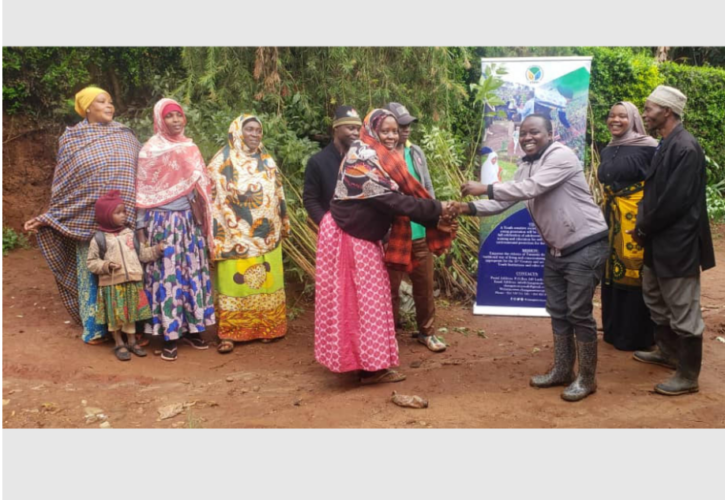When Hamida Ally Hoza learned she had won 20 tree seedlings for her participation in a radio program, she heard the news in the excited voices of her children, neighbours, and relatives. Mrs. Hoza, a 40-year-old farmer, lives in Ngulwi village in the lush landscape of Lushoto District in Tanzania’s Tanga Region. She tends to her half-acre farm, filled with various fruit-bearing trees.
She says: “As an environmentalist, I was very excited, and I called the station to confirm it was true. Since then, I have increased my participation in the Uliza polls by asking more questions, which have been answered on the radio and have expanded knowledge to many fellow farmers.” Mrs. Hoza has been engaging with Uliza polls through Utume FM’s Kilimo na Mkulima (Agriculture and the farmer) program.
Driven by her passion for environmental stewardship, Mrs. Hoza seized the opportunity to ask insightful questions through the Uliza interactive platform. Her questions inquired about echniques for gauging soil fertility, and earned her recognition as a winner in the weekly polls.
Joseph Amani is the producer of the radio program Kilimo na Mkulima on Utume FM. He says, “The strategy of awarding women has increased women’s participation in Uliza polls by 30 per cent. It has also stimulated the desire to listen and learn about agroecology.”
An initiative facilitated by Utume FM and a local NGO called Changamoto Youth Development Organization distributed over 1,000 tree seedlings between April and July 2023. These seedlings were awarded to winners like Mrs. Hoza and distributed within their communities, creating a movement towards ecological sustainability. This endeavour is part of the Interactive Radio for Ecologically Sustainable Agricultural Practices (IRESAP) project, that aims to educate and empower small-scale farmers, particularly women and youth, across Tanzania’s northern and central regions.
Recognizing the gender gap in participation, Utume FM devised strategies such as incentivizing women’s engagement through tree giveaways, which proved highly effective. Mr. Amani said there was a significant surge in women’s involvement, fostering a more inclusive platform for learning and dialogue.
Utume FM working with these kinds of groups shows they’re dedicated to overall development. They spread educational materials and encourage discussions on eco-friendly farming methods, helping build a community focused on caring for the environment and staying strong economically.
Mrs. Hoza’s experience shows how radio programs can make a big difference. Learning new things inspired her to switch to organic farming, which is better for the environment. Her story highlights how one person’s actions can inspire others, reflecting the mission of Utume FM: to help communities grow and thrive in a sustainable way.
The project “Interactive Radio for Ecologically Sustainable Agricultural Practices” (IRESAP) Phase I was funded and supported by Biovision Foundation. The project is now in its second phase.
Farm Radio International used its evidence-based participatory and interactive radio strategies to communicate with women, men and youth from rural communities in central and northern Tanzania on improving their resilience and livelihoods through the adoption of ecologically sustainable agricultural practices.
We worked with five radio stations to research, design, produce and evaluate two series (each of 16 weeks) every year for three years. These programs gave hundreds of thousands of farming families access to gender-responsive information on ecologically sustainable agriculture practices. We used a combination of proven interactive radio formats, mobile phone-based interactivity tools, and gender-responsive strategies to target increased awareness, knowledge and uptake of ecologically sustainable agriculture practices.
This story is adapted from an article written by Farm Radio International called “Tanzanian radio station runs competition. The prize? Trees! ” To read the full story, go to: https://farmradio.org/tanzanian-radio-station-runs-competition/

